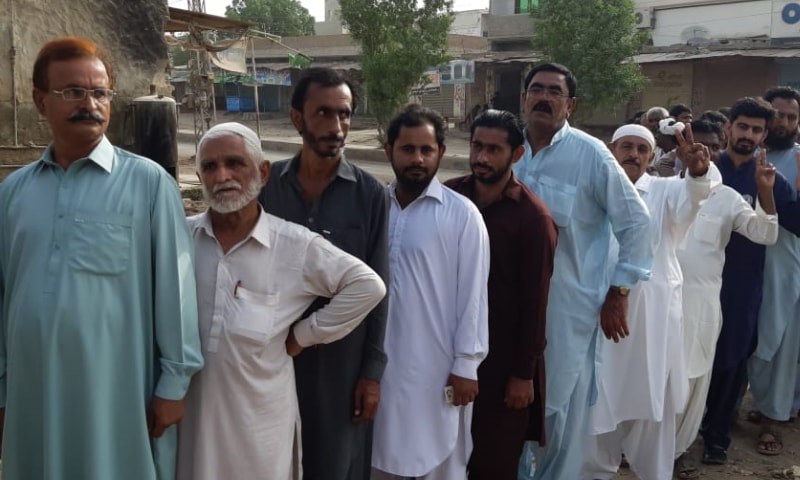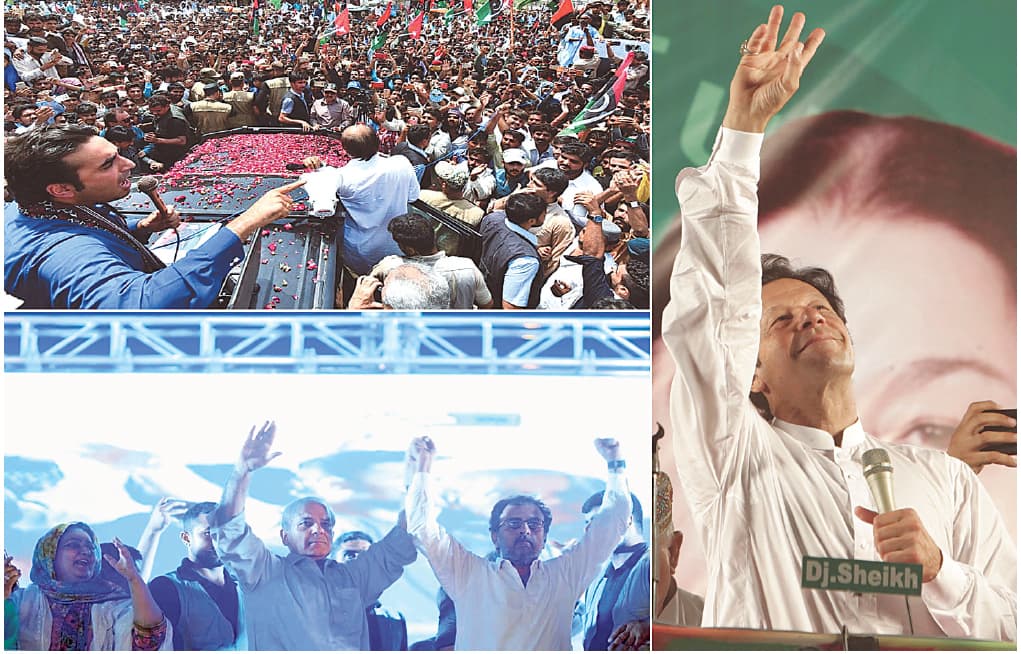Millions of registered voters are flocking to polling stations across the country to cast their vote in Pakistan’s 11th general election. According to DawnNewsTV, the first vote has already been cast — in Khyber Pakhtunkhwa’s Charsadda.

The battle is set to come down to three parties: Pakistan Muslim League-Nawaz (PML-N), Pakistan Peoples Party (PPP) and Pakistan Tehreek-i-Insaf (PTI).
While polling stations officially opened for voting at 8am, enthusiastic citizens queued up outside their respective stations as early as 7am. PML-N Chief Shahbaz Sharif was among the first people to cast his vote, according to DawnNewsTV. Speaking to the media outside the polling station in Model Town, Lahore, he requested that people come out and vote for PML-N.
Election 101: Everything you need to know about casting your vote
July 25 was earlier declared a public holiday by the ECP, as an effort to increase voter participation.

At 371,388, a record number of troops have been deployed at polling stations at the ECP’s request to maintain law and order and take action against harassment.
Polling stations will remain open for voting till 6pm, as per the deadline announced by the ECP for voters.
- QUICK LINKS
- Follow all live updates on Dawn’s election blog
- Check NA details and results on the interactive map
- Visit the election site
- Watch table of live results after 7pm (PST)
INSIDE POLLING STATIONS
What to expect
A total of 8,508 polling stations and 244,687 polling booths have been established across the country. As many as 40,632 of the polling stations are combined and there are 23,104 male and 21,322 female polling stations. Around 17,007 polling stations have been declared highly sensitive.

According to the ECP, green ballot papers represent National Assembly candidates while white ballot papers represent provincial assembly candidates.
Step one: Polling officers will cross check the NICs and names of voters with the data in the voter lists. The voters name and (silsila number) will be called out for the polling agents to hear.
The names will then be crossed out with a straight line drawn with a ruler. The voters’ thumbs, from the point of the nail to the joint, will be dipped in ink.
Step two: The assistant presiding officers will sign and stamp (mohr lagana) the back of the ballot paper. The voters will then go behind the polling screens to stamp the symbols of their preferred candidate.
Step three: The white and green ballot papers will be dropped into ballot boxes by voters.
The ECP has instructed voters to bring original NICs without which they will not be allowed to cast their vote. Additionally, voters with expired NIC cards are allowed to cast their votes.
The doors of the polling stations will be closed after 6pm. However, voters who are inside the stations when the gates close will be allowed to register their vote.
In case security personnel observe any malpractice on election day, they have been asked to first report immediately to ECP-appointed presiding officers (PO) posted at polling stations.
If the ECP’s officers fail to act, the personnel can then approach the officer in-charge of security at the polling station, who may exercise their magisterial powers and punish offenders under Sections 174,176, 177,183 and 194 of the Elections Act, 2017.
Security officials will be able to arrest without a warrant any individual believed to be impersonating someone else or to be involved in any illegality.
Individuals can be sentenced to jail, on the spot, for six months (but not longer) if they run afoul of security officials.
FINAL ARRANGEMENTS
Apparatus handed over to polling staff
A day earlier, presiding officers collected polling apparatus — including ballot boxes and other voting material — from ECP’s distribution centres across Pakistan in the presence of police and army personnel.
The material was then transported to polling stations amid strict security.
Voters lists were put up at polling stations as well as the code of conduct for election day.
In Khyber Pakhtunkhwa, police have arranged surveillance vehicles equipped with live video streaming cameras.
The specially prepared surveillance vehicles will have four cameras each installed on them which will be able to detect a human body from a mile’s distance.
TOTAL CANDIDATES
Independents outnumber candidates fielded by political parties
In all, 11,673 candidates are in the run, 3,428 for National Assembly and 8,245 for provincial assembly seats.
The statistics shared with the media reveal that independent candidates outnumber the candidates fielded by political parties. The number of candidates fielded by parties is 5,661 while the number of independent candidates in the race is 6,012.
For National Assembly seats, 1,623 candidates are in the race, 1,805 of them fielded by political parties and 1,623 independents. KP is the only province where the number of independent candidates for National Assembly seats is higher than those fielded by parties.
For National Assembly seats, parties have fielded 820 candidates in Punjab, 441 in Sindh, 335 in KP, 173 in Balochistan and 36 in the federal capital. The number of independent candidates for National Assembly seats includes 714 from Punjab, 373 from Sindh, 386 from KP, 117 from Balochistan and 33 from the federal capital.
For provincial assembly seats, 8,245 candidates are in the run, 3,856 fielded by parties and 4,389 contesting independently. The number of independent candidates is higher for Punjab and Sindh assemblies than the party ticket holders. As many as 2,256 independents and 1,719 party ticket holders are contesting Punjab Assembly seats while 1,186 independents and 993 party candidates are in the run for Sindh Assembly seats. In KP and Balochistan there are 675 and 469 party ticket holders and 470 and 477 independents, respectively.
Of the 120 parties enlisted with the ECP, 95 are contesting elections and seven of these 95 parties have failed to meet the mandatory requirement of awarding five per cent party tickets for general seats to women.
THE VOTERS
There are 105,955,409 registered voters, including 59,222,927 male, 46,730,569 female voters besides 1,913 transgender voters, of whom 1,356 are in Punjab alone.
The data shows that 17,443,094 voters forming over 10 per cent of the total are in the age bracket of 18-25 years. This means they will be exercising their right to franchise for the first time. Another 28,995,231 voters are aged between 26 and 35 years.
As many as 215,527 of the voters are suffering from physical disabilities, 163,995 of them male and 52,432 female. The ECP has announced the people with disabilities would be able to avail the postal ballot facility and those who choose to go to polling stations should be allowed to vote on priority basis, without making them to wait in the queue. The ECP has trained polling staff to sensitively deal with such voters.
The total number of voters belonging to religious minorities comes to 3,362,016, which includes 1,864,800 male and 1,497,216 female voters.
CURTAIN FALLS ON CAMPAIGNS
PTI, PML-N confident of victory
Election campaigns came to a close on Monday night — as directed by the ECP — with PML-N and PTI leadership rounding off their campaigns by predicting victory for themselves.

On the last day of canvassing, PTI chief Imran Khan addressed four meetings in Lahore, PML-N president Shahbaz Sharif concluded his party’s election campaign by holding a public meeting in Dera Ghazi Khan. PPP chairman Bilawal Bhutto-Zardari addressed people in Shahdatkot, Garhi Khairi, Jacobabad, Shikarpur and Garhi Yasin before going to the graves of former prime ministers Benazir Bhutto and Zulfikar Ali Bhutto.
“Despite all odds PML-N is winning the July 25 polls. We will form the government at the Centre and in Punjab as our victory is certain,” said Sharif addressing the crowd in D.G. Khan. He urged the people to vote for his party to “free Nawaz Sharif and Maryam Nawaz from jail”.
Khan addressed rallies at strategic points in Lahore to prop up his party’s chances. One of his rallies was organised in the constituency from where he himself is a contestant, facing a big challenge from tough-talking PML-N’s Khawaja Saad Rafique. “This is the time to change your destiny. You must come out to vote on July 25. You must bring others out to vote on the day,” he thundered.
CONTROVERSIAL POLLS
Questions raised about ‘free and fair’ elections
The general election has been criticised by some quarters for not being “free and fair”.

Questions have been raised over the role of the armed forces in the polling process; restrictions being placed on the media; participation of banned groups; NAB pressure on election candidates as well as the detention of political workers in the run-up to the polls.
Days ahead of the polls, former Senate chairman and PPP stalwart Raza Rabbani hit out at the ECP’s “criminal silence” over perceived irregularities in the run-up to the polls, warning of “dire consequences” for the government if the elections are “engineered”.
SURVEY FINDINGS
A public opinion survey conducted by the Sustainable Development Policy Institute (SDPI) and the Herald magazine shows that the Pakistan Tehreek-e-Insaf (PTI) enjoys a slim lead at the national level over the Pakistan Muslim League-Nawaz (PML-N).

This lead of 4 percentage points is outside the survey’s national margin of error – + 1.3 percentage points.
The Herald-SDPI survey finds that 14 per cent of the respondents in Punjab remain undecided. It is this group of voters that will clearly determine the final result of the 2018 election.
This finding is consistent with the polls conducted by Gallup and Pulse Consultants during May 2018 which also show that undecided voters hold the election in Punjab in the balance.
Courtesy: DAWN





